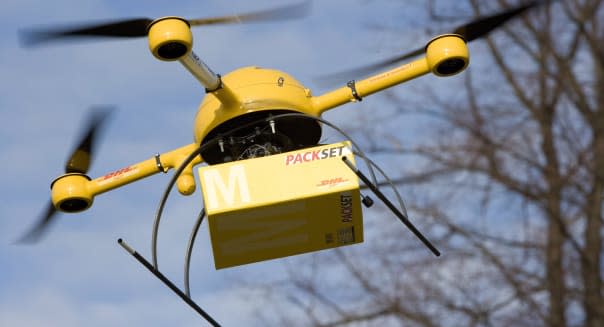Look, Up in the Sky! It's a Delivery Drone!

Like overgrown flying insects, corporate drones will be buzzing through our skies if the Federal Aviation Administration can establish rules for the operation of "unmanned aerial vehicles" (in official jargon) in commercial American airspace by September 2015, the deadline set by Congress.
Whether the FAA hits that target or not, it's just about certain that corporate UAV usage will be part of our very near future. As if to confirm this inevitability, one of the most powerful companies on Earth is soaring quickly into the drone segment.
Search in the Sky
That company is Google (GOOG), which earlier this month acquired privately held Titan Aerospace for an undisclosed amount. This isn't its first drone sortie; last May, the company's venture capital division invested nearly $11 million in Airware, which manufactures piloting systems for UAVs.
Titan Aerospace has an interesting edge that made it appealing not only to Google but also Facebook (FB), which according to media reports was also in the running to acquire it. Titan drones run on solar power and therefore are able to stay aloft for years at a time.
Why would either company want to go airborne? According to Google, its drone company purchases are part of a broader effort to spread Internet connectivity around the world by beaming it from the sky. Currently, the company is using high-altitude balloons.
No matter the delivery vehicle, the object is the same -- to gain business through the exponential growth of Internet users. Getting ads in front of even an additional fraction of either site's hordes of visitors will reap significant rewards, making the money plowed into the little aircraft more than worth the investment.
Flying Right Up to Your Front Door
Google has another angle to play. The company is testing a same-day shopping service in which customers can order products from a range of popular stores, including American Eagle Outfitters (AEO) and Walgreen (WAG). If the offering catches on, it would provide a potentially very profitable use for Google's drones.
Amazon.com (AMZN) has been developing a fleet of "octocopters," eight-propeller unmanned craft that, according to CEO Jeff Bezos, will be able to deposit a customer's goods within half an hour of the order being placed.
Cribbing its name from the retailer's current premium service, the Amazon drone effort is known as Prime Air. The company hasn't made public just how much the project is costing, but Bezos admits that it needs more investment and will require approval from relevant regulators like the FAA.
The determined CEO's enthusiasm is very apparent, though, so we can count on the Amazon air force to start bringing us our books, video games, and groceries even before the four-to-five-year time frame that Bezos estimates for rollout.
Hot Air?
These are early days for commercial drone use, and skepticism abounds, even among some who should be natural proponents of the technology.
%VIRTUAL-article-sponsoredlinks%Fred Smith, the founder and CEO of logistics king FedEx (FDX), characterized the concept of drone delivery as "almost amusing" in a quarterly conference call at the end of last year. That's not a ringing endorsement.
Nor is the quote from UPS (UPS) Chief Information Officer Dave Barnes, who told CNBC that "the idea that an individual drone with one package... that's probably not what we see in the future." He did acknowledge, however, that the means of delivery for logistics firms will undoubtedly change, adding that UPS plans to be a major player in that shift.
It'll be a while before proper regulations are set and drone technology advances to the point where they're useful in commerce and cost-efficient. But there's no doubt that commercial drones are coming to our airspace.
When it does, look for the early adopters -- the Googles and the Amazons -- to zoom ahead before the rest of the pack catches up. Sooner or later, even the doubters are sure to take to the skies.
Motley Fool contributor Eric Volkman owns shares of Facebook. The Motley Fool recommends Amazon, Facebook, FedEx, Google (A and C shares) and UPS. It owns shares of Amazon, Facebook and Google (A and C shares).

